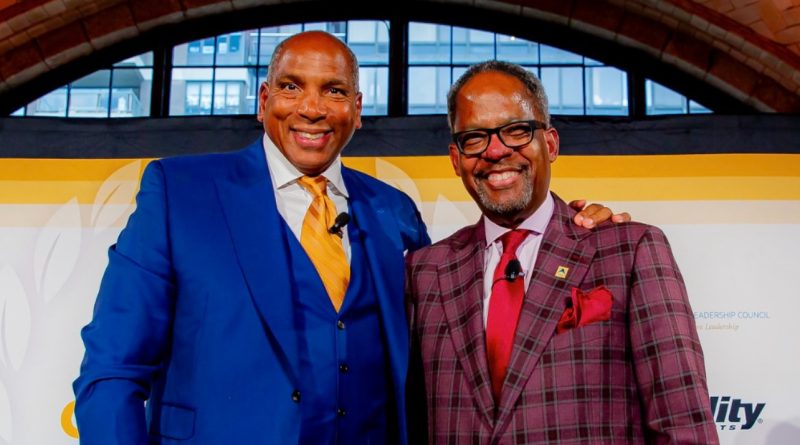Butch Graves And Michael Hyter On Corporate DEI
by Kay Rose
June 27, 2024
CDO Summit spotlighted the gap between corporate promises and actual investments in DEI.
BLACK ENTERPRISE and The Executive Leadership Council (ELC) successfully hosted the second annual Black Enterprise Chief Diversity Officer Summit and Honors on June 11, sponsored by Fidelity Investments and Merck.

During the event, Earl “Butch” Graves, Jr., CEO of BE, and Michael Hyter, president and CEO of The ELC, engaged in a thought-provoking discussion on the current state of diversity, equity, and inclusion (DEI) efforts in corporate America. The dialogue at the annual BE CDO Summit spotlighted the gap between corporate promises and actual investments in DEI, stressing the imperative for sustained actions to foster meaningful change.
Graves kicked off the conversation saying he wanted them to engage in an honest and open conversation. “There’s no one better than Michael, in his role leading ELC, to dive into this topic. It’s more important now than ever.”
Graves then asked Hyter to share insights from a recent study supported by The ELC on DEI. Hyter expressed his gratitude for the opportunity and highlighted the significance of the study, which captured the perspectives of top Black executives on their companies’ DEI efforts. He explained, “Amid all the discussions and challenges surrounding DEI, we recognized the necessity of including the voice of Black executives actively managing businesses within corporations.” The study revealed that 72% of respondents rated their respective corporations’ DEI efforts as strong, while 28% acknowledged areas needing improvement. Hyter noted that the findings were well received, particularly the emphasis on viewing DEI as a strategic business initiative rather than merely a legal obligation. He shared, “One CEO pointed out, ‘It was refreshing to consider this as integral to our business strategy, rather than a compliance issue I have to deal with.’”
Reflecting on broader societal impacts, Graves recalled the aftermath of George Floyd’s murder and the global protests that ensued. He remarked, “When we look back at the George Floyd incident, beyond the tragic event itself…” Hyter echoed this sentiment, underscoring the urgency of advancing DEI within corporate environments. The summit provided a pivotal platform for leaders to exchange strategies and reaffirm their commitment to fostering inclusive workplaces.
Hyter also addressed the broader challenge of corporate commitments to DEI. “Corporate self-interest often takes precedence over our collective interests,” he noted, highlighting a historical pattern of fluctuating interest in DEI initiatives. He stressed the importance of genuinely and strategically integrating DEI efforts to ensure their sustainability and impact. “Diversity, equity, and inclusion must be integral to our business strategies, not sidelined as optional add-ons,” Hyter added.
Graves also expressed frustration with the lack of fulfillment of corporate pledges in the wake of the George Floyd tragedy. “If we were to audit all these pledges, what percentage do you think would be fulfilled?” he asked. Hyter confirmed the disappointing reality: “Only 250 million out of the pledged 50 billion.”
The discussion then shifted to the role of African Americans in politics and corporate leadership. Graves emphasized the importance of active engagement and support for DEI initiatives. “We cannot rely on others to do what we’re not willing to do ourselves,” he stated. He called on Black leaders to bolster organizations like Black Enterprise and The ELC in their efforts to advance DEI.
Hyter echoed these sentiments, advocating for a proactive approach. “We need to be active participants rather than passive observers. Instead of expecting others to take the lead, we should actively contribute and invest in these initiatives,” he said. He emphasized the potential of the private sector to drive meaningful change in DEI, emphasizing the power of corporations to hire, develop, and contribute to economic progress.
Graves concluded with a call to action for Black corporate leaders to step up and support DEI efforts within their organizations and the broader community. “When our community reaches out to a corporation, seeking support from a Black professional within, and that individual hesitates, citing career concerns, they miss the bigger picture,” Graves lamented.
The summit served as a crucial platform for leaders to share strategies and reaffirm their commitment to creating inclusive and equitable workplaces. The insights and calls to action from Graves and Hyter underscore the ongoing importance of sustained and genuine efforts in advancing DEI in corporate America.
RELATED CONTENT: The Benefits Are On The Balance Sheet: Corporate America Must Stand By DEI And Chief Diversity Officers

